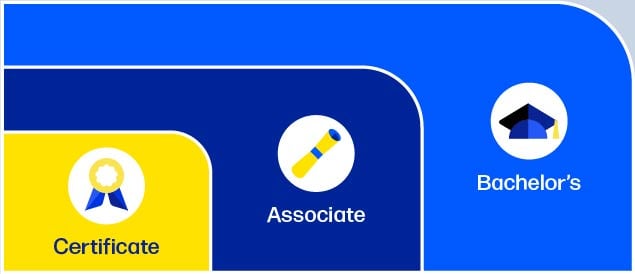Learn more about the courses and details of this degree in our program guide.
Learn more about the courses and details of this degree in our program guide.
Certification-ready skills: Build tech knowledge in coursework that’s designed to help you prepare to pursue industry-known certifications, including:
• CompTIA A+
• CompTIA Cloud Essentials+
• CompTIA Network+
• CompTIA Cybersecurity Analyst (CySA+)
• CompTIA PenTest+
• CompTIA Project+
• CompTIA Security+
• EC-Council - Certified Ethical Hacker (CEH)
• IAPP’s Certified Information Privacy Professional (CIPP)
• LPI Essentials
• PCEP Certified Entry-Level Python Programmer
• TECH+
Exam reimbursement:
Receive up to a $300 reimbursement to help cover the cost of 1 qualifying certification exam attempt when you meet eligibility requirements.
Tech-infused curriculum:
Build a strong foundation in networking, programming, hardware, connectivity, and security in our Tech Core classes, designed to help you thrive in today’s Internet of Things (IoT) economy.

We’re committed to supporting your career potential at every step. As a DeVry student — and even after you graduate, you’ll have unlimited access to Career Services, like job search strategies, resume support, industry networking, and more.
1Future programmatic changes could impact the ability to earn additional credentials enroute to an eligible degree program at DeVry. Refer to the academic catalog for details.
2Assuming enrollment in 13-17 credit hours per semester; enrollment in additional credit hours may be needed in some semesters. Minimum schedule does not include breaks and assumes 3 semesters of year-round, full-time enrollment in 13-17 credit hours a semester per 12-month period. Normal schedule includes breaks and assumes 2 semesters of enrollment in 13-17 credit hours per semester per 12-month period.
3At the time of application to the next credential level, an evaluation of qualifying transfer credit occurs, and the most beneficial outcome is applied. Future programmatic changes could impact the application of credits to a future program at DeVry. Refer to the academic catalog for details.
4Scholarships are available to those who apply and qualify. Click here for more information, including any requirements or restrictions. Students may participate in only one DeVry University-based scholarship, grant or group tuition benefit program at a time. Those who qualify for more than one program will be presumed to accept the program with the highest reduction per session cost, unless the student confirms their desire to participate in different program in writing prior to starting classes at DeVry. Scholarship and grant terms and eligibility conditions are subject to change.